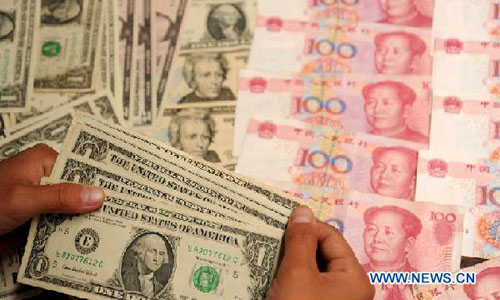Yuan value steadily rising against dollar during holiday
By Xie Jun Source: Global Times Published: 2020/10/8 21:13:40

A citizen counts the US dollars in Houma City, north China's Shanxi Province, Oct. 11, 2011. The Chinese currency renminbi, or the yuan, strengthened 103 basis points to a record high of 6.3483 against the US dollar on Tuesday, according to the China Foreign Exchange Trading system.Photo: Xinhua
The yuan quickened its pace of appreciation during China's recent holiday period, with the offshore yuan surging by more than 500 basis points during China's National Day holiday and Mid-Autumn Festival, as the country's post-coronavirus economic rebound picks up pace, while the economic and political uncertainties in the US push overseas investors to hold the yuan as a new "safe haven".
As of 15:20 pm on Thursday, the offshore yuan stood at 6.7294 against the US dollar, up by 517 basis points compared with September 30, and up by 0.446 percent compared with the previous trading day. The offshore yuan stood at 6.9628 against the US dollar on the first trading day of 2020.
The trend of appreciation for the onshore yuan was also evident, as it surged by about 230 basis points in the last week of September. On September 30, the yuan hiked by 159 basis points from the previous trading day to 6.7990 against the greenback.
The South China Morning Post attributed the surge of the currency, which it said ended the third quarter with its biggest gain in 12 years, to the fact that the currency is drawing attention as a "safe haven" from global currency volatility.
Chinese experts have attributed the yuan's recent attractiveness to multiple factors, including the country's faster-than-expected economic rebound, unsuccessful pandemic control in some overseas countries, and other short-term factors.
"Donald Trump's diagnosis for COVID-19 triggered market anticipations for more uncertainties and risks in US financial assets, pushing them to search for safer assets. The yuan is a good option as China's current economy offers a prospect for solid, healthy rebound," Zhou Yu, director of the Research Center of International Finance at the Shanghai Academy of Social Sciences, told the Global Times on Thursday.
But it is China's economic vibrancy that is underlying the yuan's surge. The country's services and manufacturing industries continued to expand in September. Retail sales also returned to positive growth finally in August, while the export machine also beat market expectations with a growth of nearly 10 percent in the month.
According to Zhou, the booming tourism and retail market during the National Day holiday sends a signal of China's economic resilience to the world, which buoyed market anticipations for higher renminbi interest rates in the future.
Based on such a strong economic rebound trend, experts predicted that the yuan would keep rising for the months to come. Dong Shaopeng, an adviser for the China Securities Regulatory Commission, told the Global Times that the yuan might continue appreciating for another year, as economic sectors like infrastructure investment, consumption and high-tech innovations continue to jump.
Zhou predicted that the yuan might surge to around 6.5 against the US dollar, although uncertainties remain considering the changing US political situation.
Zhou said that exporters to the US are mostly affected by the yuan's rise, while exporters to other countries, like Europe and Japan, are not affected seriously, as the yuan continues a stable trend against those currencies.
"This might adjust trade structure by pushing Chinese companies to reduce trade to the US, or search for solutions to offset losses, such as by transacting imported raw materials in US dollars," Zhou said.
He also stressed that the yuan's current exchange rate against the greenback is still "acceptable" and wouldn't cause too many losses to exporters, but the pressure will be more perceivable when the yuan breaks beyond 6.5 against the dollar.
A manager at a Yiwu-based mask factory, which exports mostly to the US, told the Global Times that although the yuan's rise adds costs to his business, it's not too much of a problem as the yuan is still fluctuating between an expected range of 6.7-7, unlike a 6.3-level which occurred around 2018.
Posted in: ECONOMY,BIZ FOCUS